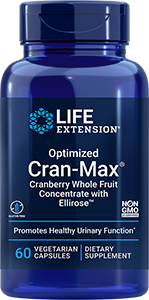| The human body is certainly no less of a high-performance engine than that of an airplane or car. Yet, although we appreciate the preventive maintenance that is part of the strategy of engine survival, we are inconsistent when we too often ignore the needs of our own bodies--that is, until we have signs of engine breakdown. As many of us love our cars and care for them, we must do the same with our bodies. Selenium intake of at least 200 mcg a day should be a consideration in the prevention of prostate cancer (PC). Low plasma selenium is associated with a four- to fivefold increased risk of PC. In addition, levels of plasma selenium also decrease with age, resulting in middle-aged to older men being at a higher risk for low selenium levels. Ideally, baseline levels of selenium should be obtained before beginning routine selenium supplementation. It would make sense to begin such a micronutrient and mineral assessment at age 25 and perhaps every 10 years thereafter. A large-scale study of almost 11,000 men in Maryland showed that the protective effects of high selenium levels, and similarly that of the alpha-tocopherol isomer of vitamin E, were only observed when the concentrations of the gamma tocopherol isomer of vitamin E were also high. In this study, the risk of prostate cancer declined with increasing concentrations of alpha-tocopherol, with the highest concentration associated with a 68% PC risk reduction. For gamma-tocopherol, men with levels in the highest fifth of the distribution had a fivefold greater reduction in the risk of developing PC than men in the lowest fifth (p = .002). The observed interaction between alpha-tocopherol, gamma-tocopherol, and selenium suggested that combined alpha- and gamma-tocopherol supplements, used in conjunction with selenium, should be considered in future PC prevention trials. In another study, vitamin E succinate inhibited cell growth of PC cells in the LNCaP line by suppressing androgen receptor expression and PSA expression. The combination of Eulexin (flutamide) with vitamin E succinate resulted in a more significant inhibition of LNCaP cell growth. The same investigators demonstrated that selenomethionine also showed an inhibitory effect on LNCaP cell growth but that this appeared to be independent of androgen receptor or PSA pathways. | 
Because you are a friend of the Life Extension Foundation® I am going to make you a life-extending offer you will find hard to refuse. Would you like a VIP Goody Bag from Life Extension? That’s just part of my offer. But wait, there’s more. Lots more… If you attend my FITCAMP in Malibu on November 17-21, 2010 you will meet some of the world’s top experts in the fields of longevity, fitness, nutrition, and mind/body practices. Normally, they are only accessible to large groups in expensive seminars. At FITCAMP, not only will you meet them personally, but you will also spend one-on-one quality time enjoying their company, picking their brains behind the scenes, and learning how to extend your life span. Spend November 17th- 21st, 2010 at The Steven Breuer Conference Center in sunny Malibu, California. FITCAMP package prices start at $1,595 (excluding airfare). For more information and to obtain the FITCAMP schedule, visit www.fitcamp.com. Registration is limited and slots are disappearing fast. So make sure to check this out and register today. And be sure to mention that you are an LEF member to receive a members only discount, as well as the VIP Goody Bag and free autographed book copies when you attend camp. You do not want to miss this. See you there!
Greta Blackburn Please note that FITCAMP Malibu is an independent organization, and not part of the Life Extension Foundation®, which supports anti-aging research, or the Life Extension Foundation Buyers Club. |















